You can see beautiful landscapes and
on the clear day peaks of Annpurna, Manaslu, Ganesh….. but what else you can
see from the mountain center?
You can see small villages:
Ghyampesal, Lochill, Pohare and other as small neighboring villages. I will be
talking about those three villages Ghyampesal, Lochill and Pohre under the eye of the mountain center.
 |
| Morning scenery from the stairs leading to mountain center |
 |
| Lochill early in the morning |
These are rural villages. People are
cultivating the land for their own use. There are only few commercial farms,
tiny ones. People wake up early to pray, collect water, do other morning chores
and go to the field. Young ones either continue the heritage of their parents,
go to Kathmandu to have education or move to another area or country to work.
Life is simple, peaceful and like it has been always. You do your work in order
to survive. Villages got the electricity two years ago, there is no internet
connection. You never know when you have or don’t have electricity.
 |
| Takurs mother, me and Takurs son Babu |
On these villages they do have water
supply system. It is more than 40 years old. Every household pays 50 rupees a month and have access to water…
when there is access to it. The water tank has been built a long time ago, it
is small and it is also located in a place which doesn´t make the supply any
easier. Now is the monsoon season and water tank is full so there is water for
everyone. There is only approx. ten taps in the whole area and sometimes water is
available only certain hours per day. Villages have been divided into sectors
which have their own water collecting times. Men get to bathe first, women
last. Households furthest from the water source have to use many hours a day
for getting enough water for people and animals. Dry season is completely
another story… water has to be collected even further, sometimes by car from neighboring willages …
Neighboring village has also water
supply system. Every household pays 150
rupees a month and have access to water. Always... and from their own houses!
 |
| Takurs mother (Ama) carrying water to home |
EDUCATION
There are two schools in the area.
Other one is a community school Shree Dullav H.S.S Ghyampesal which has 700- 900
students. There are primary classes from 1-8 and secondary classes from 9-12.
Schooling is free, only things they have to provide are pens, school uniform
and some copies of books. Sometimes this is too much and parents don´t have
money to put they children to school. Theoretically 95% of children go to
school but during the farming season some children work on the fields and don’t
participate the school work. Children ware the same school uniform year after year. Pencil or pen is a treasure for some of these children.
 |
| Community school Shree Dullav H.S.S Ghyampesal |
 |
| Children singing the national anthem in the morning |
In school for 700 - 900 children there are
only two toilets, one classroom has a leaky roof and area don’t have any gate
which makes buildings vulnerable to vandalism. There is urgent need for extra
space because in some days there are four different classes (English, Nepali,
Physical health, social science, environment science or creative arts) going on
at the same time in same classroom! National recommendation for primary school
having pupils/ teacher is 20 and this school average is 30. For secondary level
the recommendation is 25 and in this school it is around 40 students. On the
day I visited the school the number was 52 students for one teacher.
School is funded by ministry of
education but a school is mainly running with donations done by local
community. Ministry isn´t funding any buildings or even all the teacher´s
salaries! During time I visited the school there was construction going on.
Because it is farming season it is difficult to get labor and the teachers were
doing the construction work. Principal was on the roof also helping. Amazing people! One of the teachers told me that sometimes he don´t get any salary but comes to school every day anyway.
 |
| Principal and teachers at the construction site |
 |
| Tuk Nath Adhikari, pricipal of Evergreen boarding school and Shiva Prasad Bhatta, principal of Shree Dullav H.S.S Gyampesal |
The other school is Evergreen
boarding school which has classes from nursery to primary classes eight grade.
For some funny reason in the boarding school they don’t have seventh grade at
all? Fee for boarding school is 400 -1000 rupees a month. Children have
possibilities to have secondary level education in they own area but many of
them don’t continue after eight grade or stop even earlier. Those young ones
who want to have work or continue their education these villages offers little
or nothing.
HEALT POST & AMBULANCE
 |
| Health Post |
 |
| "tie" jeepin sisältä katsottuna |
Do I think this village might need a boost, little help? I do. Even thou these are always really delegate matters. You never know is your good also good for those to whom you are offering it.
I believe there should specially be
options for young people and Chance for Change project is one of these options. Project has started. Delegates are out, construction of the mountain center can start. I will tell
more about it later!
 |
| Jameas and Takurs family looking from the map where England is |
 |
| Takur, James and some of the Nepali youngster connected to the project |

Thanks Tanja for the really interesting and eye-opening insight to Nepal's everyday life! It really helps to put your priorities into right order. Keep up the English posts and good luck!
VastaaPoista